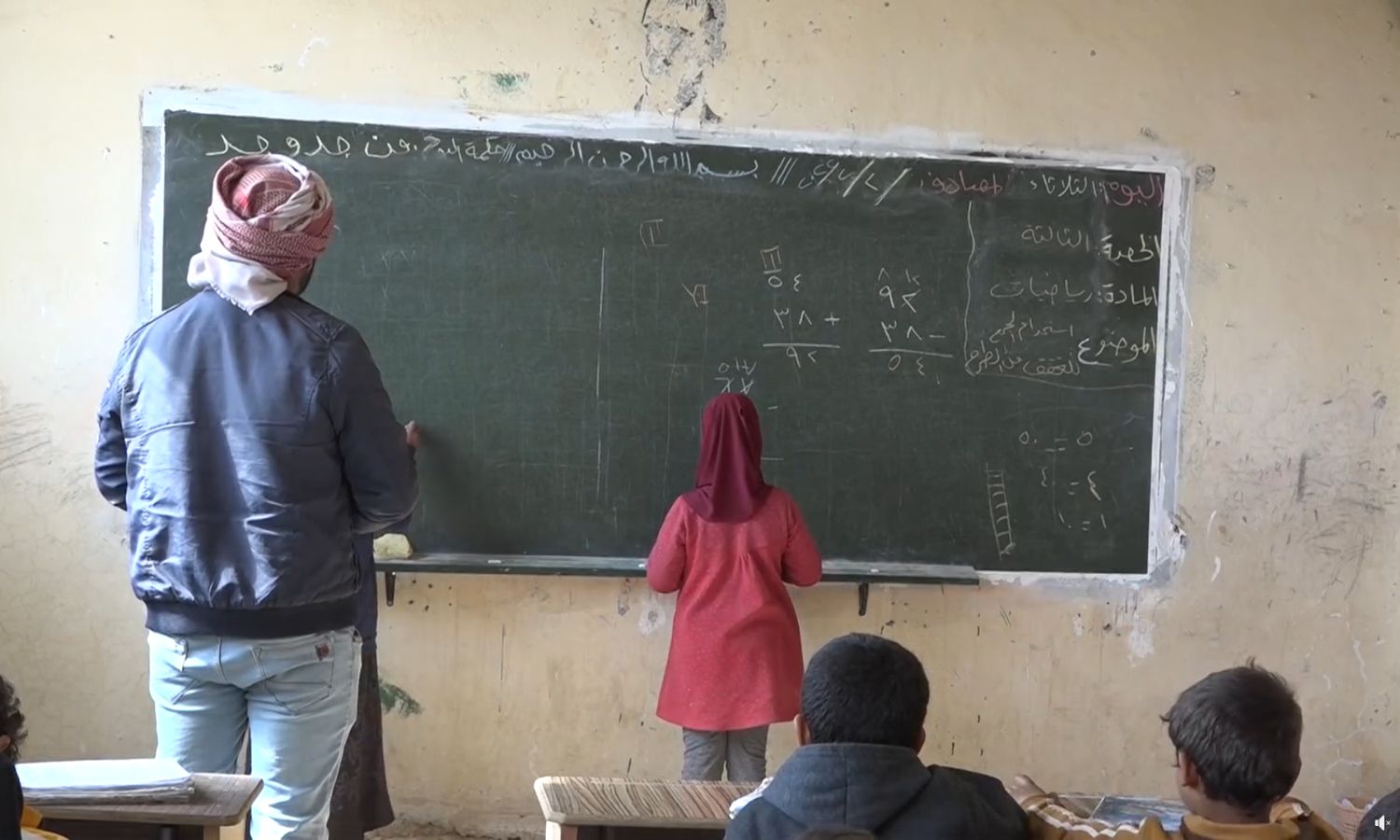



The school year has ended in the areas under the control of the Autonomous Administration in Deir Ezzor province, eastern Syria, amid ongoing criticisms of the educational curricula and the quality of education provided by the region’s residents.
Families of students in elementary and middle school levels believe that education in the region is not yielding results and do not believe in the feasibility of their children continuing their education in the area, according to what some told Enab Baladi.
The living conditions play a role in forcing parents to work long hours to meet their families’ needs, reducing the time available to follow up on their children’s education. In addition to insecurity, which poses an obstacle to sending their children to school for fear of repeated security incidents in the region.
The Syrian Democratic Forces (SDF) have turned some schools in the area into military headquarters, increasing residents’ fears of security events in the region.
In addition to the above, schools in the region suffer from deteriorating infrastructure and the necessary supplies to complete the educational process, according to teachers from the area who spoke to Enab Baladi.
Enab Baladi met with a group of local residents, including Mahmoud al-Ali, who said that the current curricula provided by the United Nations are not suitable for students, as they repeat themselves at each educational level and rely on self-learning, putting a burden on the students.
There is a second curriculum in the region set by the Autonomous Administration, according to Jassem al-Abed, a local resident. However, it is “contrary to Islamic law” and not applicable in Deir Ezzor because the curriculum does not align with the region’s culture.
Al-Abed believes that the Syrian curriculum adopted in 2013 is better than the curricula offered in the region’s schools, as it meets all educational standards for all stages.
Due to the residents’ disbelief in the offered curricula, some are forced to send their children to Quran memorization institutes to teach them reading and writing.
Although Deir Ezzor needs education, which has deteriorated since the Islamic State organization took over the province in mid-2014, some residents have refrained from sending their children to school, protesting the Autonomous Administration’s attempts to change the curriculum at the expense of the lack of support in the educational sector.
The Autonomous Administration, managing the regions east of the Euphrates in recent years, has not attempted to improve services or even build schools to accommodate some students in Deir Ezzor. Instead, it focused on re-evaluating the available educational curriculum and proposing a new one that teaches students the philosophy of the founder of the Kurdistan Workers’ Party (PKK), Abdullah Öcalan.
The imposition of the new educational curriculum was considered offensive to their culture by the residents of the province, and others viewed it as “offensive to religion,” leading to protests and strikes in mid-2022.
Residents of the region, including teachers, view the educational staff in the areas under the control of the Autonomous Administration as unqualified and in need of more training courses to elevate the educational level in the region.
Abdul Muneim al-Zaher, a teacher in one of the northern rural Deir Ezzor schools, told Enab Baladi that teachers suffer from a lack of training, affecting their ability to convey information to students.
He added that the low salaries of teachers drive them to seek other job opportunities, thereby not focusing on their work as teachers, especially given the difficult living conditions in the area.
Jaber al-Khalif, a teacher at a school in Hajin town in eastern Deir Ezzor, told Enab Baladi that teachers are doing their best amidst difficult security and economic conditions, especially after the region witnessed military operations that disrupted the educational process in many schools, and in some areas, students were deprived of an entire school year.
He added that the lack of resources also posed an additional burden, as schools lacked basic educational facilities such as books, desks, and school supplies, which negatively affected the quality of education and the students’ future. Despite these challenges, teachers try to give their best to their students.
An official source in the Deir Ezzor Teachers Union, who preferred to remain anonymous because he does not have permission to speak to the media, told Enab Baladi that the educational process needs monitoring to reach a successful level.
He added that only a few teachers care about their work due to a lack of experience, the selection of incompetent and inexperienced individuals for teaching positions, and the lack of essential supplies for schools, some of which need a surrounding fence, not to mention the missing desks and health-related infrastructure.
With the outbreak of armed clashes in Deir Ezzor in mid-last year, the SDF took over the elementary school in the village of Sabha, eastern Deir Ezzor, causing the children of the area to miss school to this day, as the school has become a military headquarters with armed men appearing on its roof from time to time, according to Enab Baladi‘s correspondent in the area back then.
Similar actions followed the SDF measures in the region, converting many schools into military headquarters, some of which were later vacated.
During the security campaign launched by the SDF in the region, which rose up after the arrest of the Deir Ezzor Military Council leader, Ahmad al-Khabil, by the SDF, the latter took over 21 schools and converted them into military points, according to the Syrian Network for Human Rights (SNHR).
According to the latest statistics on August 10, 2023, issued by the Education and Training Authority in the Autonomous Administration of North and East Syria (AANES), the number of students expected to join the schools reached about 864,000 students, under the supervision and care of more than 43,000 teachers.
Enab Baladi’s correspondent in Deir Ezzor, Obadah al-Sheikh, contributed to this report.
if you think the article contain wrong information or you have additional details Send Correction